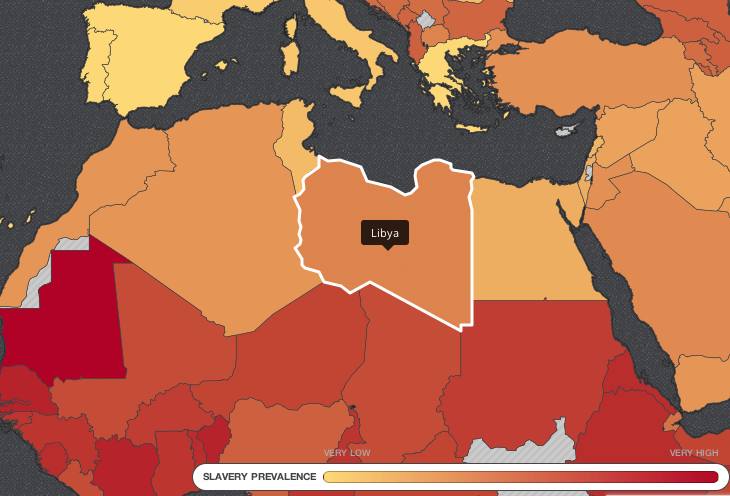
Tripoli, 18 October 2013:
With 17,693 people apparently living as modern-day slaves in Libya, according to the first-ever Global Slavery Index, the country is ranked by it as having the greatest prevalence of “slavery” in North Africa.
The actual figure, however, could be higher, with up to 19,000 people estimated to be living in slave-like conditions in the country.
Modern slavery takes many forms and is known by many names, the organisers of the report said. “Whether it is called human trafficking, forced labour, slavery or slavery-like practices, victims of modern slavery have their freedom denied, and are used and controlled and exploited by another person for profit, sex, or the thrill of domination.”
The new annual report, produced by anti-slavery organisation, the Walk Free Foundation, has ranked Libya 78th in a list of the 162 countries included in the study, which shows estimated modern slavery figures by population.
The figures make Libya the worst for slavery in North Africa, with Algeria ranked at 91, Morocco at 93, Tunisia at 122 and Egypt at 113. Even though Algeria and Egypt have higher actual numbers of modern-day slaves (up to 74,000 in Algeria and 75,000 in Egypt), by population figures, Libya fares the worst.
The country rated by the index as having the highest number of modern-day slaves by population in the world is Mauritania, a West African country where slavery is deeply entrenched. Despite having a population of only 3.8 million, between 140,000 and 160,000 people are “enslaved” there, according to the report.
The Middle East and North Africa account for 2.46 percent of the world’s 29.6 million people living in modern “slavery”, the foundation said, with migrant workers identified as particularly vulnerable in the region. It also had the highest measured level of discrimination against women – reflected in high levels of forced and child marriages – as well as widespread exploitation of female domestic workers.
Although the majority of modern-day slaves were in Africa and Asia, the report pointed out that no continent was completely free from slavery. The UK, Ireland and Iceland shared 160th ranking, having the lowest numbers of slaves. However, even the UK has more than 4,000 people living as “slaves”, according to the Global Slavery Index.
Calculations for the report were made by looking at three factors: estimated prevalence by population, a measure of child marriage, and data on human trafficking both in and out of the country. The Walk Free Foundation intends that the Global Slavery Index will be a tool that can help end modern slavery.
The figures do not appear to include the widespread practice in some Gulf and other countries, seen by many as tantamount to traditional slavery, whereby workers, mainly from Asia, have their passports taken away from their by their employers, their promised salaries slashed or not paid at all for months, are not allowed to travel or change jobs without their employers’ permission or leave the country.
The full report can be read here.
[/restrict]







